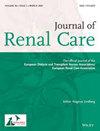Use of toe systolic blood pressures and toe brachial pressure indices in people receiving dialysis: A scoping review
Abstract
Introduction
Current guidelines for noninvasive lower limb vascular testing specify a preference for toe brachial pressure measurement to aid in the diagnosis of peripheral arterial disease populations with high suspicion of peripheral vessel calcification, such as those with kidney failure with replacement therapy.
Objectives
The aim was to identify the current literature on toe systolic blood pressure and toe brachial pressure index for individuals with kidney failure who are receiving replacement therapy.
Design
A scoping review.
Methods
MEDLINE, CINAHL, AMED and SPORTDiscus were systematically searched between July 15 and July 30, 2023. The scoping review followed the Arksey and O'Malley framework, with data reported according to the Preferred Reporting Items for Systematic Reviews and Meta-analyses extension for scoping reviews.
Results
Sixteen studies were included in the review. There was limited data examining the significance of toe systolic blood pressure and toe brachial pressure index during a dialysis session. There were differences in the normative values for toe brachial pressure index values used in the studies and limited reporting on the measurement protocols used to determine toe systolic blood pressure and toe brachial pressure index.
Conclusion
The review found limited data examining the clinical utility of toe systolic blood pressure and toe brachial pressure index in populations receiving dialysis. The use of toe systolic blood pressure and toe-brachial index to identify peripheral artery disease in this population is important. However, there is limited evidence and conflicting information on measurement protocols, reliability, diagnostic accuracy, and prognostic capacity.

 求助内容:
求助内容: 应助结果提醒方式:
应助结果提醒方式:


